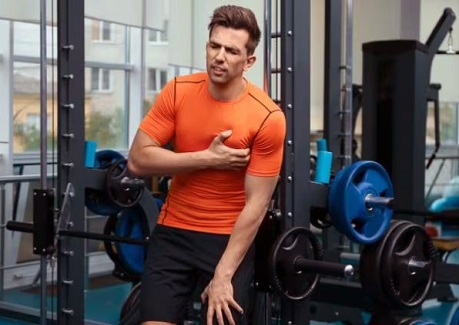COVID-19 Disrupts Response Habituation and Leaves the Heart Vulnerable to Stress in Healthy People
Nikhil Prasad Fact checked by:Thailand Medical News Team May 05, 2025 9 months, 2 weeks, 6 days, 1 hour, 17 minutes ago
Medical News: New study finds COVID 19 history disrupts the body’s natural stress response even in active adults
A new Irish study has found that even physically active individuals may suffer from hidden cardiovascular issues long after recovering from COVID-19, particularly when it comes to how their bodies handle stress. Researchers from the University of Galway and the University of Limerick in Ireland discovered that individuals with a history of COVID-19 infection showed a disrupted pattern of response habituation—a critical biological process that helps the body adapt to repeated stress.
 COVID-19 Disrupts Response Habituation and Leaves the Heart Vulnerable to Stress
COVID-19 Disrupts Response Habituation and Leaves the Heart Vulnerable to Stress
in Healthy People
Response habituation is the body’s natural way of “getting used to” recurring stressors. Under normal conditions, repeated exposure to the same stress leads to smaller reactions over time, helping to protect the heart and nervous system from being overworked. But this
Medical News report reveals that COVID-19 may impair this key adaptive function.
Stress test reveals lingering cardiovascular dysfunction
In the study, 60 adult members of various running clubs in Ireland—average age 44.85 years, with an even split between men and women—were divided into three groups: those who never had COVID-19, those who had it once, and those who had it more than once. The participants were subjected to a lab-based stress-induction test involving mental arithmetic challenges, which were repeated twice to test how the body adjusted to stress over time.
Key cardiovascular metrics such as heart rate (HR), systolic blood pressure (SBP), and diastolic blood pressure (DBP) were closely monitored before and during both stress exposures.
Alarming findings in COVID survivors
The findings were concerning. Participants who never had COVID-19 showed a normal drop in diastolic blood pressure during the second stress exposure—evidence of healthy habituation. But those who had experienced COVID-19, especially multiple times, did not show this drop. Instead, their diastolic blood pressure remained elevated, suggesting that their cardiovascular systems failed to adapt to the repeated stress.
Moreover, individuals with a history of COVID-19 also displayed consistently elevated heart rates throughout the testing period compared to those who were never infected. These lingering abnormalities in stress response could signal higher future risk for stress-induced cardiovascular problems, even in those who appear outwardly healthy and physically fit.
What this means for the long term
The study’s authors warn that COVID-19 may have long-lasting effects on the body's cardiovascular resilience, particularly its ability to cope with psychological or physical stress. Since response habituation acts as a natural buffer against chronic stress, its disruption may leave COVID survivors mo
re susceptible to conditions like hypertension, arrhythmias, or even heart attacks in high-stress environments.
Their conclusion stresses the importance of monitoring cardiovascular health in post-COVID individuals—even those without obvious symptoms. With so many people around the globe having been infected at least once, the researchers argue that this hidden consequence of COVID-19 could contribute to a surge in stress-related cardiovascular issues in the years ahead.
The study findings were published in the peer reviewed journal: International Journal of Psychophysiology.
https://www.sciencedirect.com/science/article/abs/pii/S0167876025000790
For the latest COVID-19 News, keep on logging to Thailand
Medical News.
Read Also:
https://www.thailandmedical.news/news/french-study-finds-that-sars-cov-2-preferentially-infects-intestinal-cells-causing-barrier-damage-and-potential-systemic-spread
https://www.thailandmedical.news/news/covid-19-impairs-ovarian-function-and-causes-premature-ovarian-failure-in-women-below-40
https://www.thailandmedical.news/news/covid-19-makes-monocytes-dysfunctional-post-infection-raising-risk-of-opportunistic-infections-or-pathogen-reactivation
https://www.thailandmedical.news/articles/coronavirus
https://www.thailandmedical.news/pages/thailand_doctors_listings
